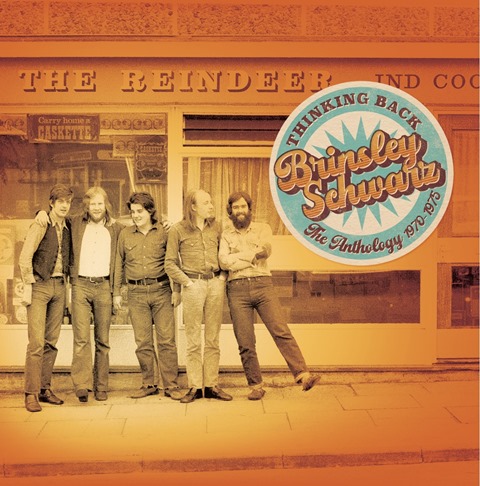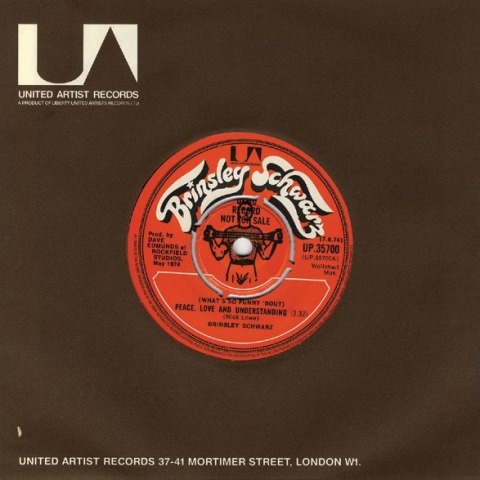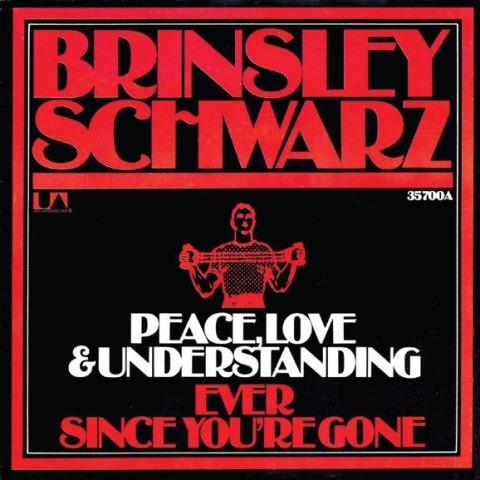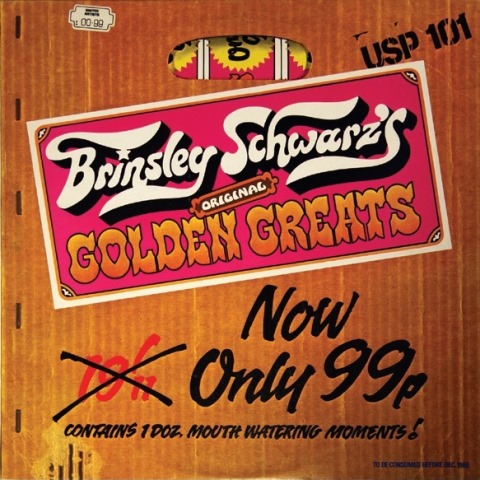Music Reissues Weekly: Brinsley Schwarz - Thinking Back: The Anthology | reviews, news & interviews
Music Reissues Weekly: Brinsley Schwarz - Thinking Back: The Anthology
Music Reissues Weekly: Brinsley Schwarz - Thinking Back: The Anthology
How the wayward pub rockers helped to set the agenda for new wave

Typically tagged as the originators of pub rock, Brinsley Schwarz were where Nick Lowe honed his muse. But there were twists, turns and a waywardness which makes approaching them as a linear proposition difficult. Sometimes, they pointed one way yet then headed in a different direction. Next, off elsewhere. The complete-catalogue, seven CD set Thinking Back - The Anthology 1970-1975 encapsulates all of this.
They had evolved from Kippington Lodge, a straightforward pop group which had released five singles on Parlophone over 1967 to 1969. Chafing at their unadventurous persona, they rejigged their line-up and style to debut live as Brinsley Schwarz in December 1969. The name came from that of their guitarist.
 Allied with the rebranding, the newly rootsy, Band-slanted outfit were picked up by Portobello Road-based management company Famepushers – a name in direct aspirational contrast to what Kippington Lodge had achieved. Moving fast, there was a brush with producer Mickie Most who passed on them, the recording of soundtrack music for a James Bond-styled Omar Sharif TV series and the arrival into their orbit of former Jimi Hendrix tour manager Dave Robinson. Despite being based in the area at the heart of London’s anything-goes freaksville, Famepushers were ambitious and had money.
Allied with the rebranding, the newly rootsy, Band-slanted outfit were picked up by Portobello Road-based management company Famepushers – a name in direct aspirational contrast to what Kippington Lodge had achieved. Moving fast, there was a brush with producer Mickie Most who passed on them, the recording of soundtrack music for a James Bond-styled Omar Sharif TV series and the arrival into their orbit of former Jimi Hendrix tour manager Dave Robinson. Despite being based in the area at the heart of London’s anything-goes freaksville, Famepushers were ambitious and had money.
Still without a label, Brinsley Schwarz recorded an album at the Rolling Stones-favoured Olympic Studios and jetted off to play New York’s Fillmore East in April 1970 at the bottom of a three-band bill. Just before flying out, they signed in the UK to the Liberty label (soon to be subsumed by the United Artists imprint). The trip involved a chartered plane filled with music journalists and hangers on, and was meant to introduce the band to the UK’s music industry with a splash. It was all filmed for a proposed document of the jaunt. In the event, Famepushers went bust and Dave Robinson became the band’s manager.
 The eponymous first album was issued that April, a few weeks after a promo episode that was instantly seen as hubris: the Fillmore hype. Apart from one co-written track, its seven songs were written by the band’s bassist Nick Lowe. A country leaning set, it was solid rather than exceptional. The Omar Sharif show never emerged. The film of the Fillmore jaunt was also nowhere to be found. Further dead ends were recording sessions with US country singer Jim Ford and the past his prime PJ Proby. Brinsley Schwarz were in danger of turning into a backing band for hire. No cigars.
The eponymous first album was issued that April, a few weeks after a promo episode that was instantly seen as hubris: the Fillmore hype. Apart from one co-written track, its seven songs were written by the band’s bassist Nick Lowe. A country leaning set, it was solid rather than exceptional. The Omar Sharif show never emerged. The film of the Fillmore jaunt was also nowhere to be found. Further dead ends were recording sessions with US country singer Jim Ford and the past his prime PJ Proby. Brinsley Schwarz were in danger of turning into a backing band for hire. No cigars.
Despite all this, they were now a known name and a second album arrived at the end of 1970. It was wryly titled Despite It All. All eight of its loose, good timey, country flavoured songs were written by Lowe. By this point, they were living together in a communal house found by Robinson in Northwood, on the fringes of north-west London. There, they had a large room in which to rehearse.
Getting any further seemed difficult. They backed the Robinson-associated Ernie Graham on his 1971 album. Brinsley Schwarz seemed stuck. Then, in June 1971, Robinson saw a US band named Eggs Over Easy at The Marquee. Instantly fired up by their multi-genre approach and the seemingly unlimited catalogue of cover versions they drew from, he immediately after the show went to the Northwood house and told the band that this is what they should be doing: stretching out stylistically by embracing any genre they fancied and that they should tighten up by focusing on songs over vibe.
 Duly advised, Lowe and drummer Billy Rankin band saw Eggs Over Easy at Kentish Town’s Tally Ho pub and embraced Robinson’s vision. Their manager also brought second guitarist Ian Gomm into the band. They were now Bob Andrews (keyboards, vocals), Ian Gomm (guitar, bass, vocals), Nick Lowe (bass, guitar, vocals), Billy Rankin (drums) and Brinsley Schwarz (guitar). The next and third album, January 1972’s Silver Pistol, featured shorter songs, and mixed cover versions with songs by Gomm and Lowe. They played The Tally Ho for the first time on 19 January 1972 soon after its release. Just over two years on from becoming Brinsley Schwarz, they were now a band which played pubs.
Duly advised, Lowe and drummer Billy Rankin band saw Eggs Over Easy at Kentish Town’s Tally Ho pub and embraced Robinson’s vision. Their manager also brought second guitarist Ian Gomm into the band. They were now Bob Andrews (keyboards, vocals), Ian Gomm (guitar, bass, vocals), Nick Lowe (bass, guitar, vocals), Billy Rankin (drums) and Brinsley Schwarz (guitar). The next and third album, January 1972’s Silver Pistol, featured shorter songs, and mixed cover versions with songs by Gomm and Lowe. They played The Tally Ho for the first time on 19 January 1972 soon after its release. Just over two years on from becoming Brinsley Schwarz, they were now a band which played pubs.
Belying its mix of material, Silver Pistol was Brinsley Schwarz’s most coherent album so far. As their third year began, the band seemed to have found itself. After a soul influence was incorporated into September 1972’s fourth album Nervous On The Road, Brinsley Schwarz had hit upon a persuasive musical stew. This time, Gomm contributed a single song alongside covers and a Bob Andrews/Nick Lowe co-write. Otherwise, the songs were Lowe’s. The album featured his “Surrender to the Rhythm,” their first classic song and a paean to the joys of music thematically along the lines of The Lovin’ Spoonful’s “Do you Believe in Magic.” Another of Lowe’s songs on the album, “Don’t Lose Your Grip on Love,” was just-short of classic.
A fifth album arrived in 1973. It evidenced the lengthy, stylistically varied sets they had been playing in the pubs. On record, this was the point after which it became increasingly hard to figure out what Brinsley Schwarz were about. There were two Goffin and King songs on the album, and a version of The Heptones’ “Hypocrite.” As a single, the reggae cover was released as by The Hitters than Brinsley Schwarz. Another 45 pulled from the album was a version of The Cadillacs' doo-wop chestnut “Speedo.” There was also a single pairing two Beatles songs, issued under the name Limelight. It seemed that being a living jukebox on stage rather than propagating the band's own songwriting was reflected by what issued on record. Confusing. Low sales too
 The sixth and final album was preceded by yet another cover version as a single: Ernie K Doe’s “Cried my Last Tear.” While the album, 1974’s anachronistically packaged The New Favourites of Brinsley Schwarz, was produced by Dave Edmunds and had a more assured and unified sound it also included unusual choices of outside material – notably, the 1963 Hollies B-side “Now’s the Time.” Beat music, doo-wop, reggae, soul: they did them all. Lovingly and engagingly. But the stylistic miscellany wasn’t going to help Brinsley Schwarz get marketed. This was balanced against New Favourites’… opener, “(What’s so Funny ’Bout) Peace, Love and Understanding,” another Lowe gem. Issued as a single, it failed to sell. It was the same with the album. A try at a seventh album resulted in eleven mostly soul-slanted tracks which, apart from two singles from the sessions, were unissued at the time. Brinsley Schwarz played their final show in March 1975. It had been an eccentric trip.
The sixth and final album was preceded by yet another cover version as a single: Ernie K Doe’s “Cried my Last Tear.” While the album, 1974’s anachronistically packaged The New Favourites of Brinsley Schwarz, was produced by Dave Edmunds and had a more assured and unified sound it also included unusual choices of outside material – notably, the 1963 Hollies B-side “Now’s the Time.” Beat music, doo-wop, reggae, soul: they did them all. Lovingly and engagingly. But the stylistic miscellany wasn’t going to help Brinsley Schwarz get marketed. This was balanced against New Favourites’… opener, “(What’s so Funny ’Bout) Peace, Love and Understanding,” another Lowe gem. Issued as a single, it failed to sell. It was the same with the album. A try at a seventh album resulted in eleven mostly soul-slanted tracks which, apart from two singles from the sessions, were unissued at the time. Brinsley Schwarz played their final show in March 1975. It had been an eccentric trip.
What came a little later is celebrated. Robinson founded Stiff Records in 1976. Lowe recorded for it solo and, early on, was its house producer. Bob Andrews and Brinsley Schwarz were amongst the founders of the Robinson-managed The Rumour, who became Graham Parker’s backing band. Billy Rankin continued drumming in a few bands, including Ducks Deluxe. In time, Ian Gomm emerged as a solo artist. When Nick Lowe’s first album, Jesus of Cool arrived in March 1978, its eclecticism chimed with that embraced by Brinsley Schwarz in the three years up to their 1975 demise. Only this time, in the context of new wave, it made sense.
Thinking Back - The Anthology 1970-1975 supplements what was issued with demos, the shelved seventh album and a mass of live recordings. Overall, this is more than a document of either the band synonymous with pub rock or a group of wayward musicians. Here, then, is the exemplar of the 57-varieties, patchwork-quilt stylistic agenda accommodated by new wave after the gloss of punk began to fade. No wonder Elvis Costello recorded a version of “(What’s so Funny ’Bout) Peace, Love and Understanding.”
- Next week: head-spinning box set dedicated to Hawkwind’s Space Ritual
- More reissue reviews on theartsdesk
- Kieron Tyler’s website
Share this article
The future of Arts Journalism
You can stop theartsdesk.com closing!
We urgently need financing to survive. Our fundraising drive has thus far raised £49,000 but we need to reach £100,000 or we will be forced to close. Please contribute here: https://gofund.me/c3f6033d
And if you can forward this information to anyone who might assist, we’d be grateful.

Subscribe to theartsdesk.com
Thank you for continuing to read our work on theartsdesk.com. For unlimited access to every article in its entirety, including our archive of more than 15,000 pieces, we're asking for £5 per month or £40 per year. We feel it's a very good deal, and hope you do too.
To take a subscription now simply click here.
And if you're looking for that extra gift for a friend or family member, why not treat them to a theartsdesk.com gift subscription?
more New music
 Waylon Jennings' 'Songbird' raises this country great from the grave
The first of a trove of posthumous recordings from the 1970s and early 1980s
Waylon Jennings' 'Songbird' raises this country great from the grave
The first of a trove of posthumous recordings from the 1970s and early 1980s
 Lady Gaga, The Mayhem Ball, O2 review - epic, eye-boggling and full of spirit
One of the year's most anticipated tours lives up to the hype
Lady Gaga, The Mayhem Ball, O2 review - epic, eye-boggling and full of spirit
One of the year's most anticipated tours lives up to the hype
 Slovenian avant-folk outfit Širom’s 'In the Wind of Night, Hard-Fallen Incantations Whisper' opens the door to inner space
Unconventional folk-based music which sounds like nothing else
Slovenian avant-folk outfit Širom’s 'In the Wind of Night, Hard-Fallen Incantations Whisper' opens the door to inner space
Unconventional folk-based music which sounds like nothing else
 'The Art of Loving': Olivia Dean's vulnerable and intimate second album
Neo soul Londoner's new release outgrows her debut
'The Art of Loving': Olivia Dean's vulnerable and intimate second album
Neo soul Londoner's new release outgrows her debut
 Music Reissues Weekly: The Peanut Butter Conspiracy - The Most Up Till Now
Definitive box-set celebration of the Sixties California hippie-pop band
Music Reissues Weekly: The Peanut Butter Conspiracy - The Most Up Till Now
Definitive box-set celebration of the Sixties California hippie-pop band
 Doja Cat's 'Vie' starts well but soon tails off
While it contains a few goodies, much of the US star's latest album lacks oomph
Doja Cat's 'Vie' starts well but soon tails off
While it contains a few goodies, much of the US star's latest album lacks oomph
 Mariah Carey is still 'Here for It All' after an eight-year break
Schmaltz aplenty but also stunning musicianship from the enduring diva
Mariah Carey is still 'Here for It All' after an eight-year break
Schmaltz aplenty but also stunning musicianship from the enduring diva
 Album: Solar Eyes - Live Freaky! Die Freaky!
Psychedelic indie dance music with a twinkle in its eye
Album: Solar Eyes - Live Freaky! Die Freaky!
Psychedelic indie dance music with a twinkle in its eye
 Album: Night Tapes - portals//polarities
Estonian-voiced, London-based electro-popsters' debut album marks them as one to watch for
Album: Night Tapes - portals//polarities
Estonian-voiced, London-based electro-popsters' debut album marks them as one to watch for
 Album: Mulatu Astatke - Mulatu Plays Mulatu
An album full of life, coinciding with a 'farewell tour'
Album: Mulatu Astatke - Mulatu Plays Mulatu
An album full of life, coinciding with a 'farewell tour'
 Music Reissues Weekly: Sly and the Family Stone - The First Family: Live At Winchester Cathedral 1967
Must-have, first-ever release of the earliest document of the legendary soul outfit
Music Reissues Weekly: Sly and the Family Stone - The First Family: Live At Winchester Cathedral 1967
Must-have, first-ever release of the earliest document of the legendary soul outfit

Add comment